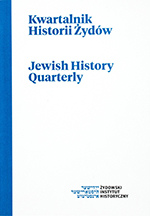Język i poetyka utworów lirycznych Jehudy ha-Lewiego w świetle jego teoretycznych rozważań nad językiem hebrajskim w Kitāb al-Chazarī (Sefer ha-Kuzari)
Language and Poetics of Yehudah ha-Levi’s Poetry in the Light of His Deliberations on Hebrew Language in Kitāb al-Chazarī (Sefer ha-Kuzari)
Author(s): Barbara GryczanSubject(s): Language studies, Language and Literature Studies, History of Judaism, Other Language Literature
Published by: Żydowski Instytut Historyczny
Keywords: Yehudah ha-Levi; Sefer ha-Kuzari; medieval Hebrew poetry; poetics; Medieval Hebrew language; linguistics; verbal system
Summary/Abstract: The author studied the poetic functions of verbal forms in the corpus of the poetry of Yehudah ha-Levi. To illustrate those functions she presented a selection of poems accompanied by the literary translation into Polish. For fuller understanding she also commented on the historical-linguistic background of Medieval Hebrew and the linguistic activities of medieval Jewish authors. Passages from ha-Levi’s philosophical treaty Sefer ha-Kuzari were quoted where the poet expressed his views on the uniqueness of Hebrew language - especially its communicative, prosodic and literary functions. Further on, she aimed to define the grammatical and poetic resources by which ha-Levi managed to introduce corresponding qualities within the frames of his own poetic language and to achieve an effect of literary continuity with Biblical poetry. Those poetic functions were to a large extent subscribed to the verbal forms of his language. Thus in the process of analysis the very specific character of the poetic genre and its consequences on the functioning of the grammatical units had to be taken into account. The author renounced from treating the basic grammatical categories of tense and aspect as prior and discussed the functioning of the forms by applying the tools offered by pragmatics and the grammar of discourse. This led to a more accurate characteristic which allowed to identify the functioning of verbal forms as both coherent within the system of ha-Levi’s language and innovative (more specialised) in comparison to the role-model of Classical Hebrew. It was demonstrated that in ha-Levi’s poetic discourse the functions of verbal forms are broaden to those of rhetorical devices.
Journal: Kwartalnik Historii Żydów
- Issue Year: 266/2018
- Issue No: 02
- Page Range: 323-345
- Page Count: 23
- Language: Polish
- Content File-PDF

